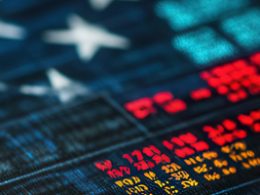by Liz Ann Sonders, Chief Investment Strategist, Kevin Gordon, Charles Schwab & Company Ltd.
It's been 38 years since I began my career on Wall Street and the lessons I learned along the way from some all-time investment greats always hold true.
My favorite quip ever said about the stock market was by Sir John Templeton. I had the great pleasure of meeting John many years ago when he appeared as a guest on Wall $treet Week With Louis Rukeyser (more on that below), on which I was a regular panelist. He perfectly summed up what really drives the stock market—notably not using a single word that isn't directly tied to investors' emotional state:
"Bull markets are born on pessimism, they grow on skepticism, they mature on optimism and they die on euphoria."
Some of the messages imbedded in Templeton's most famous quote—as well as in those below—are even more important to ponder given today's lofty valuations and signs there still exists some investor complacency. There is nothing wrong with rejoicing in bull markets; but as recent volatility reminded investors, markets don't rise in a straight line. As such, we should always heed the messages from some of the greats of finance.
It was 1986 …
Reminiscences of a Stock Operator was written by Edwin LeFevre and was first published in 1923. It is a fictionalized biography of Jesse Livermore, an actual legendary trader and speculator of that era. Below are some of the most memorable passages from that dog-eared book sitting on my shelf:
Edwin LeFevre
"The sucker has always tried to get something for nothing, and the appeal in all booms is always frankly to the gambling instinct aroused by cupidity and spurred by a pervasive prosperity. People who look for easy money invariably pay for the privilege of proving conclusively that it cannot be found on this sordid earth."
"Speculators buy the trend; investors are in for the long haul; 'they are a different breed of cats.' One reason that people lose money today is that they have lost sight of this distinction; they profess to have the long term in mind and yet cannot resist following where the hot money has led."
"Never try to sell at the top. It isn't wise. Sell after a reaction if there is no rally."
"…there is nothing new in Wall Street. There can't be because speculation is as old as the hills. Whatever happens in the stock market today has happened before and will happen again."
Marty Zweig
Marty may be most famous for perfectly calling the Crash of '87 on precisely the Friday night before that fateful Monday, October 19, 1987 ("Black Monday"). He did so on the legendary PBS show Wall $treet Week With Louis Rukeyser—a show I would join as a regular panelist 10 years later. Some readers (let's just say of the more "seasoned" variety) might remember that prescient conversation between Marty and Lou; and thanks to YouTube, anyone can watch it.
Marty is also famous for coining two phrases that have become ingrained in many investors' minds: "Don't fight the Fed" and "Never fight the tape." Here is what he had to say about both; some of which were in his bestselling 1986 book Winning on Wall Street:
"In the stock market, as with horse racing, money makes the mare go."
"Big money is made in the stock market by being on the right side of major moves. I don't believe in swimming against the tide. The idea is to get in harmony with the market. It's suicidal to fight trends. They have a higher probability of continuing than not."
"It's OK to be wrong; it's unforgivable to stay wrong."
"I measure what's going on, and I adapt to it. I try to get my ego out of the way. The market is smarter than I am, so I bend."
"Patience is one of the most valuable attributes in investing."
Louis Rukeyser
Lou was also known for his humorous monologues every Friday night, including some of his most memorable quips:
"In Wall Street, the only thing that's hard to explain is next week."
"I never make a prediction that can be proved wrong within 24 hours."
"The best way to keep money in perspective is to have some."
But the one I'll never forget is what Lou said on the Friday immediately following the Crash of '87:
"It's just your money. It's not your life. The figures on a broker's report mean little compared to that. The people who loved you a week ago still love you today."
Quintessential investing books
- A Random Walk Down Wall Street by Burton G. Malkiel, first published in 1973
- The Intelligent Investor by Benjamin Graham, first published in 1949
- The Money Game by Adam Smith (pseudonym for George Goodman), first published in 1976
- Extraordinary Popular Delusions and the Madness of Crowds by Charles Mackay, first published in 1841
- Against the Gods by Peter L. Bernstein, first published in 1996
I could fill dozens of pages with memorable quotes from these spectacular books; but in keeping with the themes around speculation, here are some of my favorites:
Burton G. Malkiel
"It's not hard to make money in the market. What is hard to avoid is the alluring temptation to throw your money away on short, get-rich-quick speculative binges. It is an obvious lesson, but one frequently ignored."
"…there are four factors that create irrational market behavior: overconfidence, biased judgments, herd mentality, and loss aversion."
"Human nature likes order; people find it hard to accept the notion of randomness. No matter what the laws of chance might tell us, we search for patterns among random events wherever they might occur—not only in the stock market but even in interpreting sporting phenomena."
Benjamin Graham
"Abnormally good or abnormally bad conditions do not last forever."
"You will be much more in control, if you realize how much you are not in control."
"The investor's chief problem—and even his worst enemy—is likely to be himself."
"…while enthusiasm may be necessary for great accomplishments elsewhere, on Wall Street it almost invariably leads to disaster."
"An investment operation is one which, upon thorough analysis, promises safety of principal and an adequate return. Operations not meeting these requirements are speculative."
"If the reason people invest is to make money, then in seeking advice they are asking others to tell them how to make money. That idea has some element of naivete."
Adam Smith (George Goodman)
"The first thing you have to know is yourself. A man who knows himself can step outside himself and watch his own reactions like an observer."
"When the Rothschilds got the word about the battle of Waterloo—in the movie it was by carrier pigeon—they didn't rush down and buy British consols, the government bonds. They rushed in and sold, and then, in the panic, they bought."
"The irony is that this is a money game and money is the way we keep score. But the real object of the Game is not money, but it is the playing of the Game itself. For the true players, you could take all the trophies away and substitute plastic beads or whales' teeth; as long as there is a way to keep score, they will play."
Charles Mackay
"Let us not, in the pride of our superior knowledge, turn with contempt from the follies of our predecessors. The study of the errors into which great minds have fallen in the pursuit of truth can never be uninstructive."
Peter L. Bernstein
"Time matters most when decisions are irreversible. And yet many irreversible decisions must be made on the basis of incomplete information."
"We are prisoners of the future because we will be ensnared by our past."
"The information you have is not the information you want. The information you want is not the information you need. The information you need is not the information you can obtain. The information you can obtain costs more than you want to pay."
"You never get poor by taking a profit."
"Vast ills have followed a belief in certainty."
Bob Farrell
Bob is immortalized by his rules of investing—still quoted widely by investment professionals and ringing as true today as ever:
- Markets tend to return to the mean over time.
- Excesses in one direction will lead to an opposite excess in the other direction.
- There are no new eras—excesses are never permanent.
- Exponential rapidly rising or falling markets usually go further than you think, but they do not correct by going sideways.
- The public buys the most at the top and the least at the bottom.
- Fear and greed are stronger than long-term resolve.
- Markets are strongest when they are broad and weakest when they narrow to a handful of blue-chip names.
- Bear markets have three stages—sharp down, reflexive rebound and a drawn-out fundamental downtrend.
- When all the experts and forecasts agree—something else is going to happen.
- Bull markets are more fun than bear markets.
Charles Schwab, the company
Chuck Schwab, the man
"I consider my ability to arouse enthusiasm among my people the greatest asset I possess, and the way to develop the best that is in a person is by appreciation and encouragement. There is nothing else that so kills the ambitions of a person as criticism from superiors."
"I have yet to find the person, however great or exalted his station, who did not do better work and put forth greater effort under a spirit of approval than he would ever do under a spirit of criticism."
I have worked under Chuck's spirit of approval and encouragement for a quarter century—half the years Schwab has been a company—for which I'll be eternally grateful.
Five years ago, Chuck wrote a deeply personal memoir. In Invested Chuck tells a "remarkable story of a company succeeding by challenging norms and conventions through decades of change." I had the great honor of hitting the road with Chuck on his book tour after it was published. During those conversations on stages around the country—as well as our many conversations over the past 25 years—there are facets to his character and beliefs that have always guided me as I've traversed my path at Schwab.
This year, there is "Chuck." It's a new documentary by Oscar-winning director Ben Proudfoot and I highly encourage giving it a watch on YouTube (yes, I'm a biased reviewer). It is a true Masterclass—and then some—on the value of hard work, pioneering courage, entrepreneurialism, innovation, and business ethics. You can find out where it all started for Schwab (the man and the company), how Chuck went from dyslexic student to Wall Street disruptor, and as the company went from start-up to industry leader.
One of the beliefs I share with Chuck is the inability to time markets with any precision. Too many investors believe the key to success is knowing what's going to happen in the market, and then positioning accordingly. But the reality is that it's not what we know that makes us successful investors; it's what we do. In Invested, Chuck wrote:
"If I had learned anything after years in the business, it was how little I could ever know about what the market would do tomorrow."
I especially loved how Chuck closed the final chapter of Invested:
"Business is a creative process. You move forward into the unknowable future, try new things, make discoveries along the way, and repeat. It's all about learning and growth. It is why I love it and the free market of ideas that enables it and makes so many great new things possible. I like to say business is organic, like life itself, ever changing. It is the human spirit of curiosity and creativity brought to life, and why I am ever optimistic about the future."
Well said, Chuck.
Relevance
We do expect the Fed to begin cutting rates at its September meeting, and although there is some justification for a 0.50% cut, the betting odds still lean toward 0.25%. For those hoping for an aggressive approach to rate cuts, be careful what you wish for. Historically, fast cutting cycles have led to more significant equity market drawdowns relative to slow cutting cycles. In addition, historically when the Fed began cutting rates pre-emptively (e.g., pre-recession), markets performed better than when the Fed was cutting rates reactively (e.g., combatting recession conditions).
As highlighted above via the words of investment legends, investors should be cognizant of heightened risks—including unwinding carry trades, a weakening in the labor market, Fed policy uncertainty … and of course, election-related angst. That said, it ultimately comes down to long-standing investment disciplines. Heed the risk/reward benefits of diversification (across and within asset classes) and rebalancing. Try to divine whether there is a gap between your financial risk tolerance and your emotional risk tolerance. Those gaps can be surprisingly wide and often only discovered during tumultuous market periods.
"Those who do not remember the past are condemned to repeat it."













